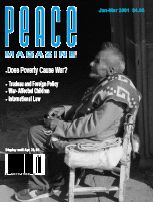
Peace Magazine Jan-Mar 2001, page 19. Some rights reserved.
Search for other articles by James Graff here
Excerpts of a lecture at the Bloor Street United Church
I will summarize highlights of the long philosophical discourse on the moral legitimacy of warfare and the notion of war crimes. One important principle is that warfare ought not to be treated as conflict amongst peoples, but amongst political entities. The proper use of violence cannot include the devastation of a people, the removal of a people from their territories, or the permanent segregation of one people by another.
Violence of people against people is so grave and serious that its use requires special justification. Only within a framework of basic human rights can the conception of war crimes arise. Historically that conception arose in the early seventeenth century. For Grotius there was little conception of human rights, but only of the rights of states. He did recognize, however, a conception of Christian duties that restrained states from the use of violence.
John Locke, at the end of the seventeenth century, did conceive of some basic rights of the person as such - the right to life, not to be governed without consent, and the right to private property. He considered it impermissible to initiate violence against those who had not themselves initiated violence.
As we advance in time, we have a richer conception of the rights of the individual. Modern conceptions of justice recognize that even those who initiated warfare without due cause also have rights. We recognize the right not to be tortured and right to due process of law.
Chapter Seven of the U.N. Charter spells out the conditions of war crimes. They have to do with initiating aggression. Any party that initiates such warfare is properly subject to sanctions through the Security Council. These rules of international law do not cover domestic warfare - intra-state warfare. However, a series of UN General Assembly resolutions legitimates the use of violence by suppressed people against colonial authorities.
Four Geneva Conventions define war crimes. They involve illegitimate targets. Once war has begun, the targets have to be a legitimate military objective - not the devastation of the enemy people, but only the undermining of the enemy political structure's capacity to continue organizing violence. Cultural monuments may not be targeted, nor the institutions that provide services to the sick and injured - schools, hospitals, churches, and so on. The taking of hostages becomes a grave breach, along with the refusal to take prisoners, or the killing of those who have surrendered.
The fourth Geneva Convention defines the illegitimate treatment of an occupied population, such as the use of torture or the seizure of property except for militarily necessary objectives. Other issues include the transfer of the population of the occupying power into the territory they occupy or the deportation of the occupied population.
Now we turn to the issue of enforcement. Hobbes held that a command is distinguished from a wish or recommendation because it is backed up by the threat of force. Some other philosophers of the "legal positivist school" added the notion that if there is no mechanism by which a threat of force can be made good, then the rule does not have the status of law. Within that framework it would appear that the only acts that would count as war crimes are those for which there is some enforcement mechanism.
But we don't have to be legal positivists. There is no reason to hold that people cannot have legal obligations in the absence of enforcement mechanisms. Only in this way do we accord legal status to the documents of the Geneva Convention, whether or not there is an enforcement mechanism.
In real warfare, we do find terrible exceptions, but mostly the Geneva Concention is observed. Even the Nazis respected it with regard to their Western Front (but not the Eastern Front). Still, people often get away with war crimes. A mechanism for enforcement would probably reduce the incidence of violations. There is a need for such mechanisms, which is why we are now developing the International Criminal Court.

Peace Magazine Jan-Mar 2001, page 19. Some rights reserved.
Search for other articles by James Graff here